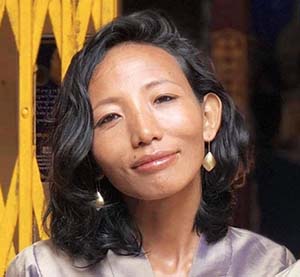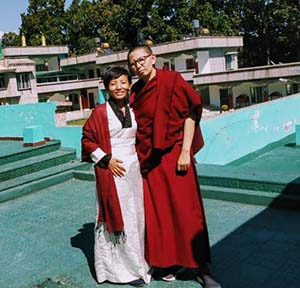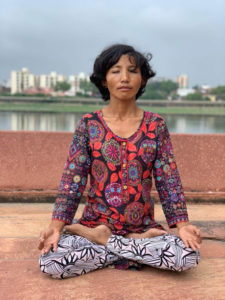 Sonam Paldon was born in Ngabring County in U-Tsang province in Tibet. Basking in the shadow of Mount Everest, 4,500 metres above sea level on the rugged plains between the Tsangpo and Chichu rivers, Sonam was raised in a semi-nomadic family. She was one of eight children, four girls and four boys. “It was like Everest was right next door,” she says, “our family raised yaks, dzhos (a mixed breed of yak and cow), sheep, goats, cows and we kept Tibetan mastiff dogs.”
Sonam Paldon was born in Ngabring County in U-Tsang province in Tibet. Basking in the shadow of Mount Everest, 4,500 metres above sea level on the rugged plains between the Tsangpo and Chichu rivers, Sonam was raised in a semi-nomadic family. She was one of eight children, four girls and four boys. “It was like Everest was right next door,” she says, “our family raised yaks, dzhos (a mixed breed of yak and cow), sheep, goats, cows and we kept Tibetan mastiff dogs.”
Sonam spent her early childhood in Tibet, long enough for her features to absorb the wild beauty of her homeland. In 1993, at the age of eight, she travelled overland via Nepal to India with her older sister Sherab, a nun who Sonam says was her teacher and biggest influence. Upon arrival at the Nepalese border she encountered dal and chai for the first time. They would become her dietary staples in India, but she remembers that the first plate of dal reminded her of vomit and her first cup of chai ended up being slyly poured through floorboards onto the backs of unsuspecting holy cattle grazing beneath.

Sonam with her sister, Sherab
After arriving in India, she stayed in the Sakya Gonpa Nunnery in Dehradun with Sherab for six months, refusing to go to school. There was talk of her becoming a nun like her sister, as she could memorise prayers easily, but she eventually reluctantly went to Suja Tibetan Children’s Villlage school, crying all the way on the bus on her first day. Years later she graduated from Delhi University with a degree in Tourism and French.
Like her ancestors back up in the clouds, Sonam has since lived a nomadic lifestyle, rambling around India without a fixed abode. She has often spent the summers in Ladakh, a rugged highland which closely resembles that where she was born. She managed a tour agency there and led French tour groups to nunneries, temples and shamans in the dusty wilderness. In the off-season Sonam would attend yoga ashrams around India and visit her sponsors in France, whom she calls “mama and papa”. She has also travelled to Thailand and Laos.
 This year this Tibetan high plain drifter has decided to settle in Dharamshala and launch her dream project that she hopes will become her life’s work. Loving Tara will be a meeting point in Dharamshala for travellers looking to experience authentic Tibetan culture frequently overlooked by other agencies. Sonam will connect travellers with shamans, yogis and nuns, and conduct tours to local nunneries or eat at local homes. The primary aim will be to promote the livelihoods of local women who are keeping traditional culture alive in exile.
This year this Tibetan high plain drifter has decided to settle in Dharamshala and launch her dream project that she hopes will become her life’s work. Loving Tara will be a meeting point in Dharamshala for travellers looking to experience authentic Tibetan culture frequently overlooked by other agencies. Sonam will connect travellers with shamans, yogis and nuns, and conduct tours to local nunneries or eat at local homes. The primary aim will be to promote the livelihoods of local women who are keeping traditional culture alive in exile.
“Women have a potential that men don’t have”, Sonam says, “men have the head and women have the heart.” She talks about all of the wars throughout history as examples of unrestrained male power causing havoc: “All over this male dominated world people are killing other people for nothing. Women shouldn’t imitate these power-hungry men; they should provide a counterweight. Women are naturally compassionate and have great concern for all sentient beings.”
“Tibetan women are very hard working”, Sonam continues, “if they get an opportunity, they will embrace it with an open heart. Tibetan women can live on their own terms. They have decision making power in the family.” She offers the example of His Holiness the Dalai Lama stating that his reincarnation could come in the female form, and the fact that nuns can now be awarded the Geshe degree, as proof of a degree of equality in Tibetan society which perhaps doesn’t exist elsewhere.
Shamanism is one area where Sonam thinks there is untapped potential in the Tibetan community. Shamans are translators of spiritual wisdom who channel divine energy and use it to heal on physical, emotional and spiritual levels. Sonam says: “There must be some shamans going unrecognised these days. They are not valued in society. I only know of two in the area around McLeod Ganj today, but back in the 1990s there were many more of them. Loving Tara will provide a platform for shamans to be able to study and remain engaged with this ancient tradition. Since the Chinese occupation of Tibet, another example of negative male energy, Tibetan shamanism has been rapidly vanishing from the face of the Earth. But with the world as it is, with problems like coronavirus, shamanism is more important than ever.”




 Print
Print Email
Email













